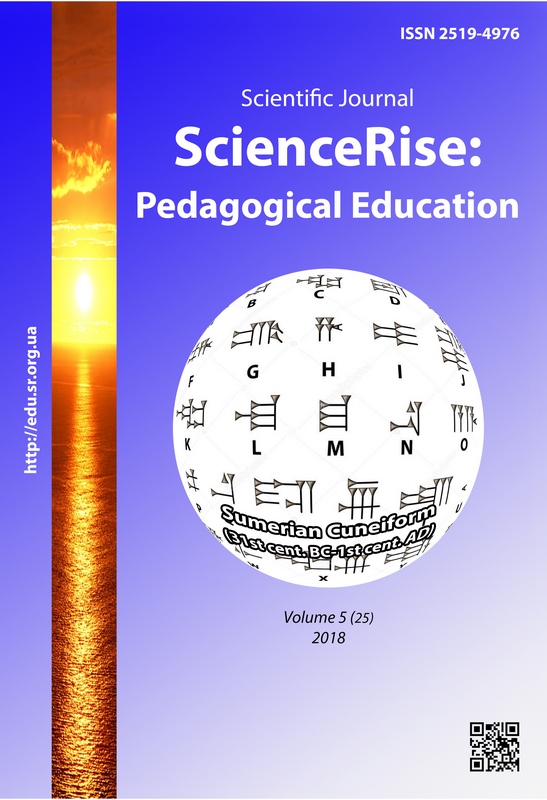Content and structure of the self-educational competence of students in professional and technical education instittions
DOI:
https://doi.org/10.15587/2519-4984.2018.134271Keywords:
self-education competence, self-education, content and structure of self-educational competence, future skilled workerAbstract
Various approaches to understanding the essence of self-education make it possible to determine that self-education is based on the knowledge, skills, abilities and methods of learning activities acquired in the process of learning, manifested as an independent cognitive activity carried out by those who study.
The article outlines the main approaches to the essence of self-education, identifies the essential characteristics of self-education (goals of self-education, management of self-education, peculiarities of activity, conditions for the implementation of self-education) and components of self-education, defines the concept of "self-educational competence" – an integrated personality characteristic that includes knowledge, skills, and experience of self-education, personal qualities that manifest themselves in the need, ability and readiness to implement a certain type of activity aimed at achieving personal, professional and social self-realization of a person, is characterized by personal and professional values that determine the readiness and ability of an individual to carry out self-education activities successfully, describes the main components of the process of forming self-educational competence of future qualified workers It was emphasized that the main criteria of the effectiveness of the process of self-education is the formation of the intellectual sphere of the individual, his/her readiness for self-education, professionalization, self-regulation, subjectivity and socialization.
The structure of self-education competence of future skilled workers of the machine-building industry is presented, in which the components are represented, which are grouped into two blocks: variative (molding) and invariant. In turn, the variational consists of five interrelated components: needs-motivational, orientational-cognitive, operational-activity, reflexive-estimating, and organizational-volitional. Their characteristics are presented.
The structural components of self-educational competence are guidelines, which determine the direction of further scientific research, vectors of the substantiation of theoretical and methodological aspects of the development of self-educational competence of a future skilled worker
References
- Ayzenberg, A. Ya. (1968). Pedagogicheskie problemy samoobrazovaniya. Sovetskaya pedagogika, 11, 51–61.
- Kodzhaspirova, G. M.; Zabrodin, Yu. M. (Ed.) (1994). Kul'tura professional'nogo samoobrazovaniya pedagoga. Moscow: Pedagogika, 545.
- Skatkin, M. N. (1984). Problemy sovremennoy didaktiki. Moscow: Pedagogika, 96.
- Bibik, N. M. (2004). Kompetentnistnyi pidkhid do prezentatsii osvitnikh rezultativ. Shkola I stupenia: teoriia i praktyka. Zbirnyk naukovykh prats Pereiaslav-Khmelnytskoho derzhavnoho pedahohichnoho universytetu imeni Hryhoriia Skovorody, 10, 24–37.
- Bukhlova, N. V. (2008). Sutnisnyi zmist poniattia «Samoosvitnia kompetentnist». Naukova skarbnytsia osvity Donechchyny, 1, 4.
- Zimnyaya, I. A. (2004). Klyuchevye kompetentnosti kak rezul'tativnaya tselevaya osnova kompetentnostnogo podkhoda v obrazovanii. Moscow: Issledovatel'skiy tsentr problem kachestva podgotovki spetsialistov, 38.
- Lokshyna, O. I. (2009). Stanovlennia «kompetentnisnoi» idei v yevropeiskii osviti. Realizatsiia yevropeiskoho dosvidu kompetentnisnoho pidkhodu u vyshchii shkoli Ukrainy. Kyiv: Pedahohichna dumka, 21–30.
- Kas'yanenko, M. D. (1988). Samostoyatel'naya rabota studenta. Kyiv: UMK VO, 280.
- Sukovykh, A. M. (2007). Pedagogicheskie problemy samoobrazovaniya starsheklasnikov v usloviyakh modernizatsii obrazovaniya Pedagogicheskaya nauka i obrazovanie v Rossii i za rubezhom: regional'nye, global'nye i informatsionnye aspekty. Razdel 6, 1.
- Mosia, I. A. (2013). Rozvytok samoosvitnoi kompetentnosti uchniv profesiino-tekhnichnykh navchalnykh zakladiv u protsesi zahalnoosvitnoi pidhotovky. Kyiv: Instytut PTO NAPN Ukrainy, 49.
- Sagitova, R. R. (2011). Formirovanie samoobrazovatel'noy kompetentsii studentov VUZA v protses se izucheniya gumanitarnykh distsiplin. Kazan, 28.
- Pavlov, V. I. (2008). Lohika u zapytanniakh, vidpovidiakh i arhumentatsiiakh. Kyiv: Tsentr uchbovoi literatury, 408.
Downloads
Published
How to Cite
Issue
Section
License
Copyright (c) 2018 Sergey Osipenko

This work is licensed under a Creative Commons Attribution 4.0 International License.
Our journal abides by the Creative Commons CC BY copyright rights and permissions for open access journals.
Authors, who are published in this journal, agree to the following conditions:
1. The authors reserve the right to authorship of the work and pass the first publication right of this work to the journal under the terms of a Creative Commons CC BY, which allows others to freely distribute the published research with the obligatory reference to the authors of the original work and the first publication of the work in this journal.
2. The authors have the right to conclude separate supplement agreements that relate to non-exclusive work distribution in the form in which it has been published by the journal (for example, to upload the work to the online storage of the journal or publish it as part of a monograph), provided that the reference to the first publication of the work in this journal is included.







